If you’ve ever wandered through a bustling Egyptian market at sunset, with the aroma of spices mingling with the gleam of hand-hammered brass lanterns, you know there’s something magical about shopping tourism in Egypt. This isn’t just about picking up a fridge magnet before heading to the airport. Shopping in Egypt is a full sensory experience—one that connects you directly to thousands of years of craft traditions, vibrant culture, and the warmth of local artisans who still practice techniques passed down through generations.
As we move into 2025, Egypt shopping has evolved beautifully. Yes, the ancient markets still thrive, but alongside them, you’ll find contemporary designers reimagining Egyptian heritage through modern lenses. Whether you’re hunting for luxurious Egyptian cotton, custom cartouche jewelry, or quirky prints that capture Cairo’s urban energy, the best shopping places in Egypt offer something for every traveler’s taste and budget.
“Conference and Exhibition Tourism in Egypt 2025: Experience the Vibrant Hub of Global Events.”
Why Authenticity Matters: Skipping the Kitsch for Local Gems
Here’s the truth that most guidebooks won’t tell you: the spectrum of Egypt souvenirs ranges wildly from overpriced plastic kitsch to genuinely handmade treasures that tell real stories. Walk past the pyramids, and you’ll see vendors hawking identical “ancient” statues that were probably manufactured last Tuesday in a factory nowhere near the Nile. Many of these mass-produced souvenirs aren’t even made in Egypt, which means your money goes everywhere except into the hands of the talented local artisans whose crafts are genuinely in danger of disappearing.
The artisans who still practice khayameya appliqué, traditional glass blowing, or pottery techniques that date back to medieval Islamic Cairo—these are the people who deserve your attention and your spending. When you buy from them, you’re not just getting a more authentic piece; you’re actively helping preserve cultural traditions that have survived centuries of change.
That’s where this insider’s guide comes in. Instead of steering you toward tourist traps, I’m taking you to incredible small boutiques, family-run workshops, and designers who are creating modern takes on Egyptian culture. These are the places where shopping tourism in Egypt becomes more than a transaction—it becomes a genuine cultural exchange.
Top 10 Iconic Souvenirs from Egypt (The Shopper’s Checklist)
Let me walk you through the absolute must-have items that capture the essence of Egyptian craftsmanship. These aren’t random suggestions—they’re the products that locals actually value, that represent real Egyptian artistry, and that you’ll treasure long after your tan fades.
1. Luxurious Egyptian Cotton Products
There’s a reason Egyptian cotton has a global reputation that precedes it. The extra-long staple fibers create fabric that’s impossibly soft, remarkably durable, and has that luxurious feel that makes ordinary bedding feel like sleeping on clouds. When travelers ask me what to prioritize, cotton items like bedding, towels, and clothing always top my list.
The secret is in the specifics. Look for items clearly marked “100% Egyptian Cotton”—this isn’t just marketing speak; it’s your guarantee of authenticity. Akhmim cotton sheets deserve special mention for their durability and those distinctive patterns featuring checkerboards and stripes that you won’t find anywhere else.
Where to find the real deal? Local textile markets in Cairo and Luxor offer the best variety and prices. If you prefer a more curated experience without haggling, Fair Trade Egypt operates shops that guarantee artisan-made products at fair prices. Either way, investing in Egyptian cotton means bringing home something that will last for years and remind you of Egypt every single night.
2. Iconic Papyrus Art and Replicas
Papyrus scrolls are uniquely Egyptian—no other country can claim this ancient writing material as its own. They pack incredibly light (a huge bonus when you’re already overweight on luggage), and once you get them framed back home, they become stunning conversation pieces that instantly transport you back to your Egyptian adventure.
But here’s where you need to pay attention: not all “papyrus” is actually papyrus. Many vendors sell slimmer, machine-printed bookmarks made from cheap dried banana leaf. Real papyrus has a distinctive crosshatched texture that you can feel with your fingers. Take a moment to examine it closely—authentic papyrus shows the layered strips of the plant fiber woven together in that characteristic crisscross pattern.
Giza has entire streets lined with papyrus shops, which creates great competition and variety. However, for guaranteed quality, head to reputable galleries like the Papyrus Institute in Giza. They specialize in mythological scenes rendered in the traditional style, and while you’ll pay more than at street vendors, you’re getting museum-quality work that will last generations.
3. Custom Gold and Silver Jewelry
Egypt offers something truly special when it comes to precious metals: exceptional craftsmanship at prices that would make Western jewelers weep with envy. Luxor and Aswan are particularly famous for custom-made cartouche necklaces—those oval-shaped pendants that spell out your name in hieroglyphics. It’s personal, meaningful, and unmistakably Egyptian.
Common motifs you’ll encounter include the ankh (the ancient symbol of life), the scarab (representing renewal and protection), and the Eye of Horus. These aren’t just pretty designs—they carry thousands of years of symbolism that Egyptians still recognize and respect.
My insider tip: always shop at well-established retailers rather than random street vendors. Ask for a detailed receipt that includes the weight of the gold—this protects both you and the seller. Insist on a certificate of authenticity, especially for higher-value pieces. If you’re looking for contemporary high-end designs that blend traditional motifs with modern aesthetics, brands like Azza Fahmy in upscale Cairo suburbs like Zamalek represent the pinnacle of Egyptian jewelry design.
4. Aromatic Perfume Oils and Incense
Egyptian perfume oils are concentrated, alcohol-free essences that pack incredible intensity into tiny bottles. Popular scents include jasmine (Egypt’s national flower), lotus flower (ancient and ethereal), rich musk, warm sandalwood, and sophisticated amber. Unlike Western perfumes that fade within hours, these oils last all day because they bond with your skin’s natural oils.
The presentation value alone makes these perfect souvenirs. Vendors pour the oils into small ornate glass bottles—often hand-painted or intricately decorated—that are beautiful objects in themselves. Even when the oil eventually runs out, you’ll want to keep the bottle.
Khan el Khalili offers the widest selection, with vendors happy to let you sample various scents until you find your perfect match. If haggling makes you uncomfortable, check out Nefertari, a respected local brand offering essential oils, soaps, and creams at fixed prices without any pressure tactics. Their products maintain traditional formulations while ensuring consistent quality.
5. Khayameya Textiles and Bedouin Embroidery
Khayameya represents one of Egypt’s most vibrant textile traditions. These colorful cushion covers and wall hangings come from the Street of the Tentmakers (Sharia al-Khayamiya) in Islamic Cairo, where artisans still practice the ancient art of appliqué. The intricate patterns feature birds, natural motifs, geometric shapes, and Ancient Egyptian designs, all executed in jewel-toned fabrics that seem to glow when light hits them.
The Street of the Tentmakers itself is worth visiting just for the experience. You’ll find workshops where multiple generations work side by side, cutting and stitching the elaborate patterns by hand. Many artisans are happy to explain their techniques, and watching them work gives you a profound appreciation for the skill involved.
Bedouin embroidery represents a different textile tradition but equally impressive. You’ll find it adorning scarves, garments, and cushions across souqs throughout Egypt. The designs are complex, rich, and vibrant, featuring patterns that Bedouin women have perfected over centuries. Each region has its own distinctive style, so a scarf from Sinai looks noticeably different from one from the Western Desert.
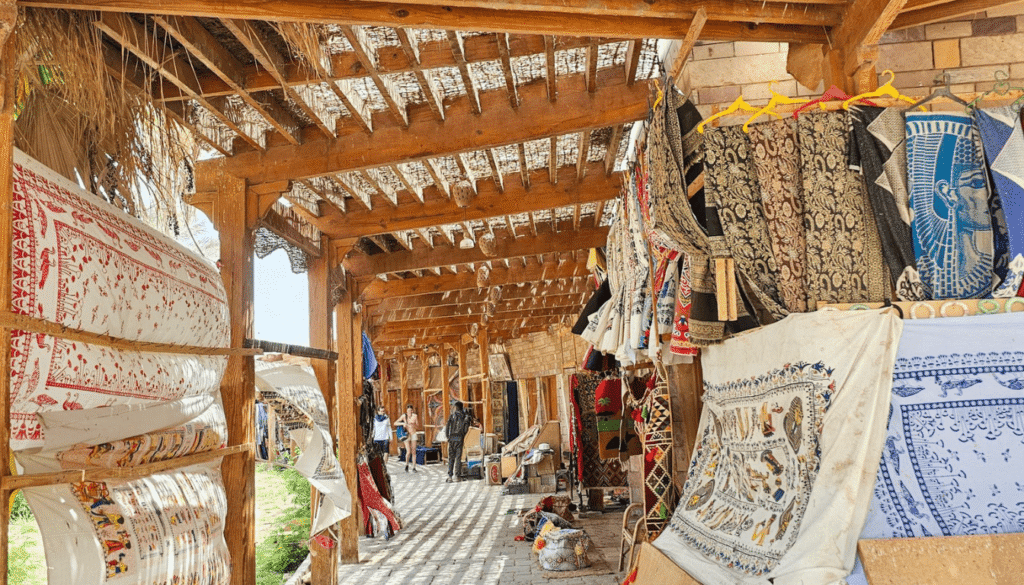
6. Handcrafted Pottery and Ceramics
Fayoum pottery has a distinctive aesthetic that sets it apart from other Egyptian ceramics. The patterns are bold yet simple, often featuring palm trees, nature scenes, and birds rendered in natural, earthy colors. There’s an organic quality to Fayoum pieces—they feel connected to the landscape they come from.
Fustat in Old Cairo represents something even more historically significant. This area has maintained a centuries-old tradition of ceramics and pottery, with workshops that trace their lineage back to 641 AD when the Islamic conquest established this as Egypt’s capital. The techniques used here have barely changed over more than a millennium.
For shopping, you have several excellent options. Fustat and Fayoum obviously offer the most authentic experience, with opportunities to visit actual workshops. Khan el Khalili provides good variety in one location, while boutiques in Zamalek curate selections of the finest pieces at higher prices but with guaranteed quality and authenticity.
7. Brass and Copper Lanterns (Fanoos)
The intricate metalwork of Egyptian lanterns and candle holders represents craftsmanship at its finest. When light shines through the pierced brass or copper, they cast shimmering patterns across walls and ceilings that transform any space into something magical. These make gorgeous, substantial souvenirs that serve as functional art pieces.
The fanoos—Egypt’s famous Ramadan lantern—has a fascinating history dating back to the Fatimid era between the 10th and 12th centuries. Originally used to light the streets during Ramadan, they’ve become iconic symbols of Egyptian culture and Islamic heritage. Modern versions range from traditional designs to contemporary interpretations, but all share that distinctive Egyptian aesthetic.
Khan el Khalili in Islamic Cairo remains the absolute best place to find authentic metalwork. The entire bazaar echoes with the sound of craftsmen hammering brass, and you can watch pieces being made in small workshops tucked into narrow alleyways. Prices vary dramatically based on size and intricacy, so there’s something available at virtually any budget.
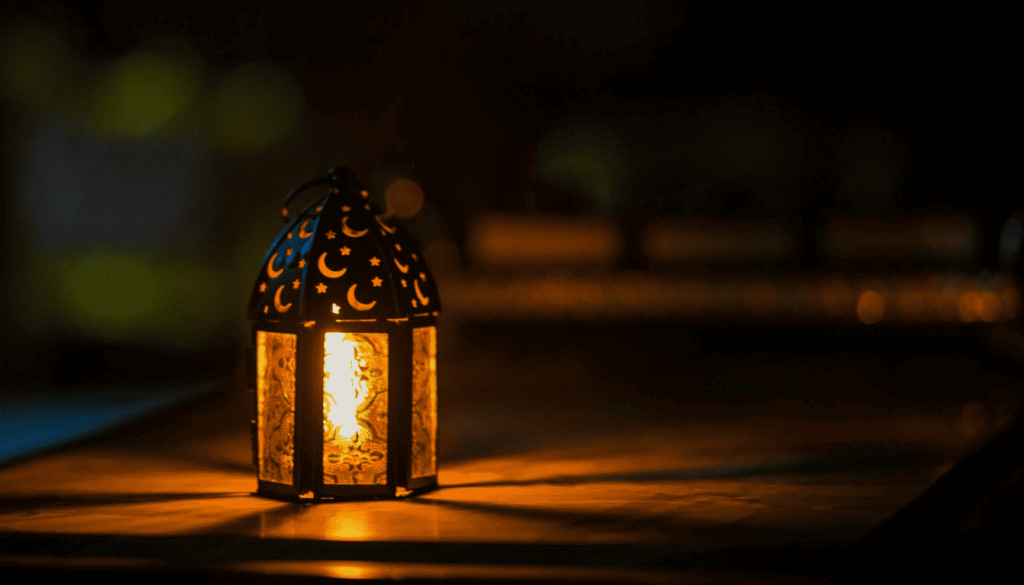
8. Traditional Egyptian Spices and Dates
Egyptian cumin has a depth of flavor that makes the stuff from your supermarket back home taste like dust. Dried hibiscus (known locally as Karkadeh) makes a refreshing summer drink—tart, slightly sweet, and beautiful ruby red. Aswan is particularly famous for its hibiscus, which locals claim has the best flavor due to the region’s unique growing conditions.
Dates deserve their own paragraph because Egyptian dates are genuinely exceptional. They’re delicious, healthy, pack well without refrigeration, and make perfect gifts for people back home. The distinctly sweet dates from Siwa Oasis are widely considered Egypt’s finest. The region’s saline soil and mineral-rich water give Siwa dates a unique flavor profile that date connoisseurs can identify immediately.
Khan el Khalili and local souqs offer good spice selections, but for absolute freshness, Aswan’s Spice Market can’t be beaten. For dates, any large grocer will stock quality options, but specialty shops near major markets often have the best selection including premium Siwa varieties.
9. Handblown Glass
Handblown glass represents one of Cairo’s most stunning handicrafts. The tradition thrives particularly in Cairo’s City of the Dead, where families have been blowing glass for generations. The pieces range from delicate perfume bottles to substantial vases and decorative objects, each one unique because of the handmade process.
Watching glass being blown is mesmerizing—molten glass gathered on a pipe, shaped through breath and skill, transformed into beauty within minutes. Many workshops welcome visitors, and seeing the process makes you appreciate why these pieces cost what they do. The colors tend toward rich jewel tones—deep blues, emerald greens, and ruby reds—that catch and refract light beautifully.
These pieces are fragile, so pack them carefully for your journey home. Many shops offer wrapping services specifically designed for international travel, and it’s worth the small extra cost for peace of mind.
10. Modern, Quirky Souvenirs & Egyptian Art
Don’t limit yourself to traditional items. Some of the best shopping places in Egypt now feature products that reflect modern Egyptian identity—urban, creative, and often delightfully irreverent.
Cairopolitan Concept Store in Garden City, Cairo, is an absolute treasure trove for hip and quirky souvenirs. They stock vibrant prints celebrating Cairo’s architectural heritage, graphic laptop sleeves printed with the iconic Cleopatra cigarette logo (a nostalgic brand every Egyptian recognizes), and sketchbooks designed to look like old Cairo bus tickets. It’s Egyptian culture filtered through a contemporary design sensibility, and it’s brilliant.
For authentic watercolors and prints by local artists, Access Art Space in downtown Cairo provides a gallery-quality selection. You’ll find everything from classical Nile landscapes to abstract interpretations of Cairo’s chaotic beauty. Prices are reasonable, and you’re buying directly from artists, which means more money goes to the people actually creating the work.
The Geography of Shopping: Best Markets and Local Destinations
Understanding where to shop in Egypt makes all the difference between a frustrating experience and a triumphant one. Each city and neighborhood has its own character, specialties, and advantages. Let me break down the shopping landscape so you can plan your retail adventures strategically.
Cairo: The Shopping Heartland
Cairo dominates Egypt shopping 2025 because it offers unmatched variety, from ancient bazaars to contemporary boutiques, all within one sprawling, chaotic, wonderful city.
Khan el Khalili Bazaar deserves its reputation as Cairo’s—and arguably Egypt’s—most famous market. Dating back centuries, this labyrinthine bazaar serves as the hub of activity for spices, perfumes, jewelry, and handmade crafts. The atmosphere intensifies late afternoon and early evening when the heat breaks and locals emerge to shop and socialize. Don’t try to navigate it on a tight schedule; allow at least half a day to properly explore its depths.
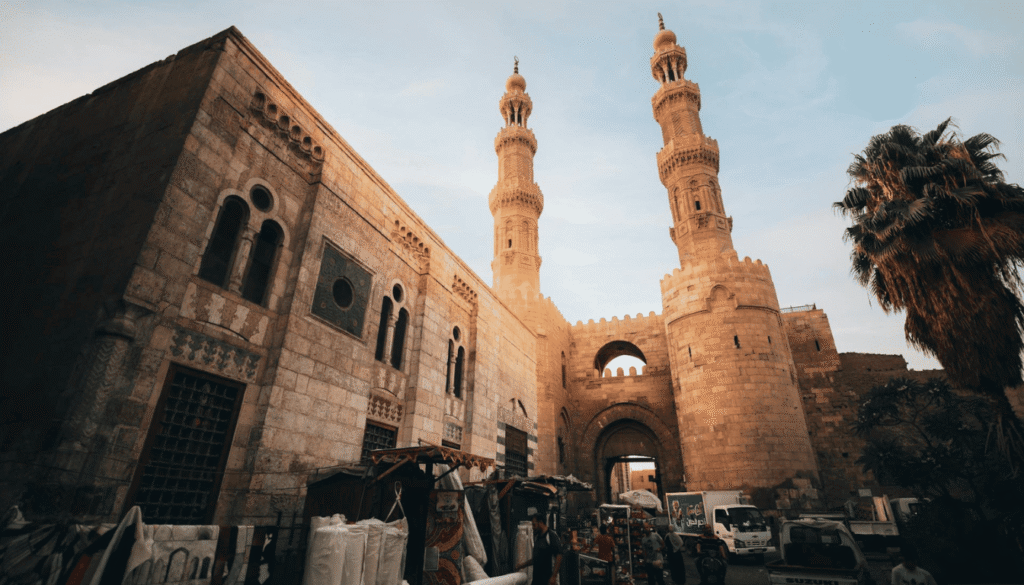
Islamic Cairo, immediately surrounding Khan el Khalili, holds hidden gems that many tourists miss. Abd El-Zaher Bookshop keeps the rare art of bookbinding alive, creating personalized notebooks and photo albums with marbled papers and leather covers. Just across the street, you’ll find the actual Street of the Tentmakers where khayameya textiles are made and sold. Walking these neighborhoods feels like traveling back several centuries.
Uptown Cairo—specifically Zamalek and Maadi—offers a completely different shopping experience. Here, boutiques display clearly priced souvenirs, eliminating the need for haggling if that’s not your style. You’ll find antique shops featuring old prints, rococo furniture, and out-of-print books alongside contemporary designer stores. Zamalek particularly excels for designer jewelry stores, where the likes of Azza Fahmy showcase pieces that blur the line between souvenir and serious investment.
Southern Egypt: Luxor and Aswan
Shopping tourism in Egypt extends well beyond Cairo, and the southern cities of Luxor and Aswan offer shopping experiences with their own distinct character.
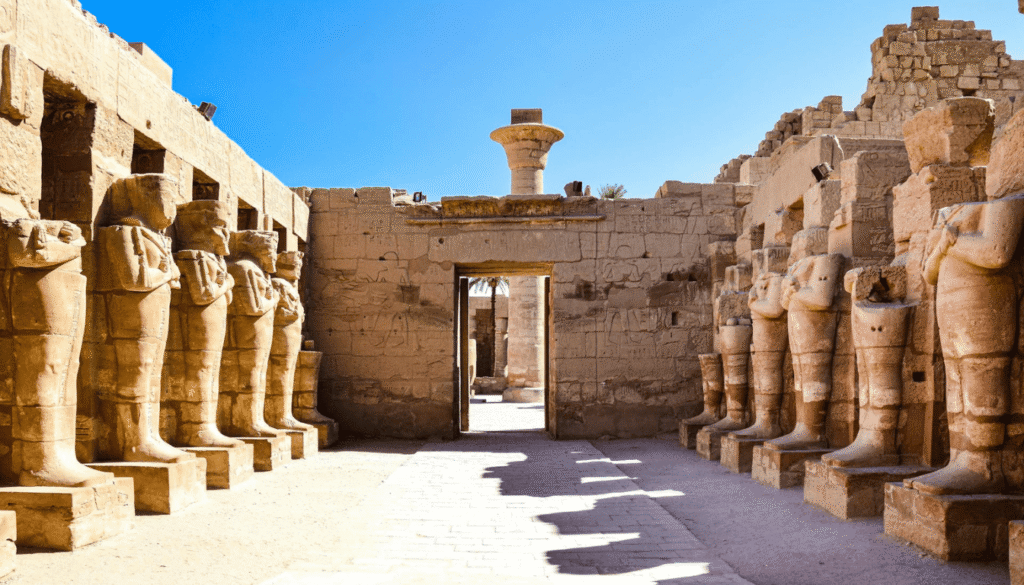
Aswan Market sits beautifully near the Nile, creating an atmospheric shopping experience where you can browse hand-woven textiles, pottery, and exquisite Nubian crafts. The Nubian influence gives Aswan’s crafts a different aesthetic from what you’ll find in Cairo—more colorful, with bold geometric patterns that reflect Nubian cultural traditions. It’s also one of the best places in Egypt to buy perfume oils, with many shops specializing in traditional scents.
Luxor’s market scene offers handmade crafts, textiles, spices, and perfumes, but its real specialty is jewelry. The Souk al-Sagha (Goldsmiths’ Market) provides an incredible variety of gold and silver jewelry, with competition among vendors keeping prices reasonable. Because Luxor has always been a major tourist destination, many goldsmiths specialize in creating custom cartouches and other personalized pieces—often completing them within 24 hours if you’re on a tight schedule.
“Luxor to Aswan Day Tour: Temple of Horus, Kom Ombo, Philae Temple and Dam.”
Coastal Cities: Sharm El Sheikh and Hurghada
Egypt’s Red Sea resorts have developed their own shopping scenes that cater to beach-vacation crowds while still offering authentic Egyptian products.
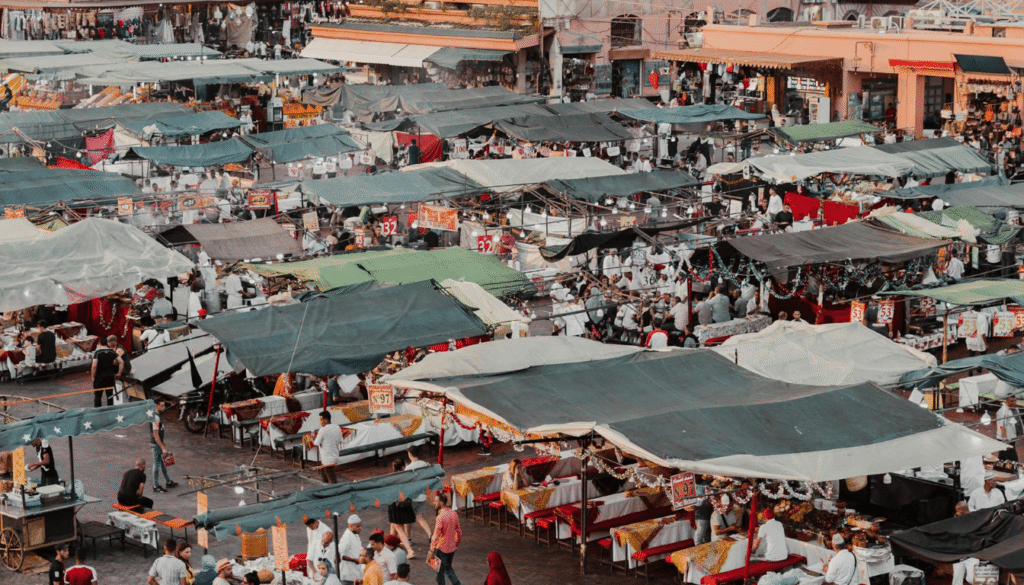
The Old Market in Sharm El Sheikh has earned recognition as one of Egypt’s premier shopping destinations. You’ll find traditional textiles, spices, jewelry, hand-painted ceramics, and handmade Bedouin rugs—all the classics. The market really comes alive in the evening when temperatures cool and the lighting creates a magical ambiance. Because Sharm caters to international tourists, many vendors speak multiple languages, making negotiations easier for non-Arabic speakers.
Hurghada’s souvenirs feature vibrant bazaars with particularly strong selections of handcrafted sand art (those incredible colored sand scenes layered in bottles) and spices. The bazaars here feel slightly less intense than Cairo’s markets, which some travelers appreciate—you can browse more casually without quite as much vendor pressure.
“One hour Camel Ride At Amazing Dessert With Transfer – Sharm El Sheikh.”
Frequently Asked Questions (FAQ)
What are the most popular souvenirs to buy in Egypt?
The top picks consistently include papyrus scrolls featuring hieroglyphics or ancient Egyptian scenes, alabaster statues and vessels, custom cartouche jewelry spelling your name in hieroglyphics, luxurious Egyptian cotton products, and hand-painted ceramics. These items combine authenticity with portability and visual appeal.
Can I bargain when buying souvenirs in Egypt?
Absolutely—bargaining is not just accepted but expected, especially in traditional markets like Khan el Khalili. It’s a fundamental part of local culture. Starting at about 50% of the asking price is normal. Be polite and patient, and don’t be afraid to walk away if you can’t reach an agreement. If haggling makes you uncomfortable, shop instead at fixed-price boutiques in upscale neighborhoods.
Where is the best place to buy authentic Egyptian souvenirs?
Local markets and souqs like Khan el Khalili offer the widest selections and competitive prices. However, unique artisanal crafts often come from specialized workshops: Luxor for alabaster work, Fustat for pottery and ceramics, Aswan for Nubian crafts and textiles, and the Street of the Tentmakers in Islamic Cairo for khayameya appliqué. Each location specializes in particular crafts perfected over generations.
What should I avoid buying in Egypt?
Steer clear of mass-produced trinkets sold near major landmarks—they’re usually overpriced and often not even made in Egypt. Absolutely avoid anything presented as a genuine antiquity unless you’re at a licensed gallery with proper export documentation. Exporting real ancient artifacts is illegal and carries severe penalties. When in doubt about authenticity, ask questions and trust your instincts.
Conclusion
Shopping tourism in Egypt 2025 offers experiences that go far beyond simple retail transactions. Each purchase connects you to living traditions, supports local artisans, and brings home tangible memories of one of the world’s most captivating destinations. Whether you’re haggling in Khan el Khalili’s maze-like alleys, commissioning custom jewelry in Luxor’s gold souq, or discovering contemporary Egyptian design in Cairo’s boutiques, you’re participating in commercial traditions thousands of years old while supporting their continued evolution.
The best shopping places in Egypt reward curiosity, patience, and a willingness to venture beyond the obvious tourist traps. Take time to learn about what you’re buying, ask artisans about their techniques, and recognize that the stories behind your purchases matter as much as the objects themselves. When you approach Egypt shopping with knowledge and respect, you’ll return home with more than souvenirs—you’ll bring back pieces of a culture that’s been captivating travelers since long before shopping tourism existed as a concept.
“Cultural Tourism in Egypt: Uncover the Wonders of Ancient History.”

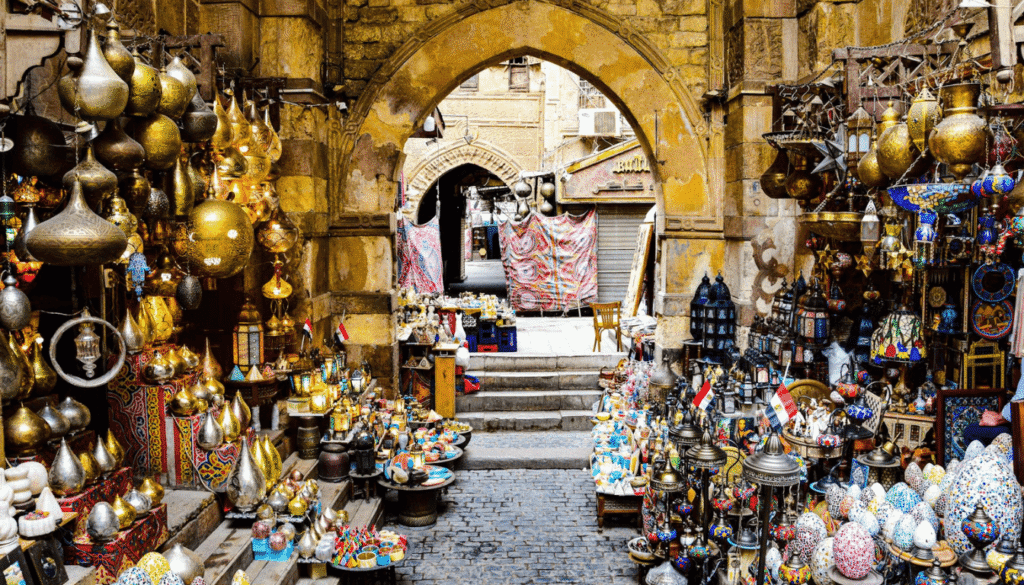
Pingback: Top 5 Historical Sites to Visit in Egypt Why Travelers Love - Discover Egypt Now